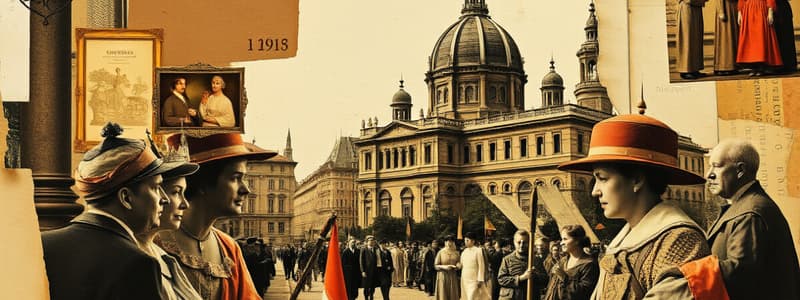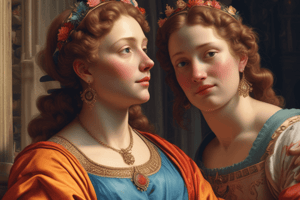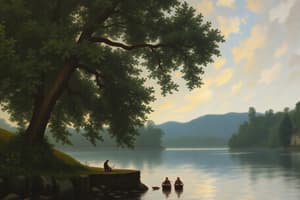Podcast
Questions and Answers
What significant event occurred in 1492?
What significant event occurred in 1492?
- The Protestant Reformation began
- Luther was condemned by the Pope
- The reign of Philip II began
- Discovery of America (correct)
Which event marked the beginning of the Protestant Reformation?
Which event marked the beginning of the Protestant Reformation?
- The Battle of Lepanto took place
- Charles I was crowned King of Spain
- Luther was condemned by the Pope
- The Protestant Reformation began (correct)
What was the effect of technical advances during the Renaissance?
What was the effect of technical advances during the Renaissance?
Increased agricultural yields and improved food production.
The secularization of culture during the Renaissance led to an increase in the power of the Church.
The secularization of culture during the Renaissance led to an increase in the power of the Church.
The _____ marked the transition from the Middle Ages to the Modern Age.
The _____ marked the transition from the Middle Ages to the Modern Age.
Who was crowned King of Spain in 1516?
Who was crowned King of Spain in 1516?
What was one consequence of the rise of cities during the Renaissance?
What was one consequence of the rise of cities during the Renaissance?
Education during the Renaissance became more exclusive to the religious world.
Education during the Renaissance became more exclusive to the religious world.
The _____ took place in 1571.
The _____ took place in 1571.
Flashcards are hidden until you start studying
Study Notes
The Renaissance Overview
- Cultural movement spanning from the 14th to 16th centuries, bridging the Middle Ages and Modern Age.
- Marked by significant changes in art, culture, and society.
Key Historical Events
- 1492: Discovery of America; expulsion of Jews from Spain, pivotal in shaping global interactions.
- 1516: Charles I crowned King of Spain, beginning a powerful reign.
- 1521: Start of the Protestant Reformation, challenging the Church's authority.
- 1545: Pope condemns Martin Luther, escalating tensions within Christianity.
- 1556: Philip II's reign commences, significant for Spanish influence in Europe.
- 1571: The Battle of Lepanto, a crucial naval confrontation between Christian and Ottoman forces.
- 1609: Expulsion of Moriscos from Spain, reflecting religious and cultural strife.
Pre-Renaissance Developments
- Transition from rural to urban life in early 13th century; cities grew as economic hubs due to trade and crafts.
- Emergence of the bourgeoisie class, gaining wealth and status through commerce.
- Cities not only became economic centers but also political, religious, and cultural loci.
- Increased secularization of education, expanding access beyond religious institutions to the nobility and wealthy citizens.
- Kings empowered cities to curb noble influence, granting them rights in governance to reflect civic interests.
- Decline of feudal nobility's political clout, even as they received compensation in land and titles.
Key Facts of the Renaissance Period
- Technical advances in agriculture boosted yields and food production, supporting a rising population.
- Growth in agricultural surpluses facilitated demographic expansion.
- The formation of extensive trade networks invigorated commerce and economic interactions.
- The 14th century experienced economic decline due to wars, epidemics, and unrest.
- Resurgence in the 15th century, leading to improved economic conditions.
- Cities became integral to political and cultural dynamics, shifting the center of power.
- The secularization of culture diminished the Church's dominance, reshaping societal values.
- Education became increasingly available to the wealthy, promoting literacy and enlightenment.
- The rising status of cities led to a corresponding decline in feudal nobility's influence.
Studying That Suits You
Use AI to generate personalized quizzes and flashcards to suit your learning preferences.




